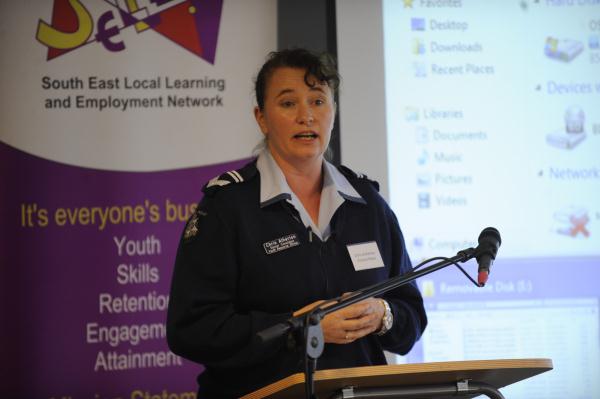
By LACHLAN MOORHEAD
VIOLENT teenagers who attack members of their family are becoming an increasing problem in the south-east.
Speaking at the Changing Trax Community Forum held in Dandenong last Friday, Magistrate Lesley Fleming said family violence had become a disturbing trend among young offenders in the region and the community needed to come up with a solution.
And the Dandenong forum has also heard that young criminals often reoffend because they think they are “bulletproof”.
“In the family environment, what we’re seeing is teenaged youth committing family violence against parents, aunts and uncles and grandparents,” she said.
“There’s concerns about this trend but there is research happening which is positive.
“But there is so much we can do.”
Ms Fleming re-iterated the desperate need for detailed research into youth offending and applauded the Dandenong Magistrates’ Court for putting initiatives in place to address the problem.
“The court has a system of working strongly with students and already we’ve got a lot of schools helping at the Dandenong Magistrates’ Court,” she said.
“We’ve got Melbourne University, La Trobe, Deakin and Monash students all at the court and the magistrates are mentoring them and they are doing work for us.
“We see this as us giving to them and them giving to us, and that’s the best relationship to have.”
The full-day forum, held to help parents and carers of troubled teens, hears from a range of speakers including representatives from Victoria Police, the Department of Human Services and a variety of specialist service providers.
In addition to the presentations there were several breakout sessions in which guests spoke to specialists about a variety of topics pertinent to youth offending, such as mental health, drug and alcohol abuse, housing, education, family cohesion and social inclusion.
One carer spoke about her experience looking after teens who have no fear of court and don’t understand the potential consequences of their actions despite being faced with serious charges.
“It’s the whole feeling of being bulletproof,” she said.
“They have no idea of the gravity of where they are.”
Ms Fleming offered some sage advice in response, noting that a youth’s perceived invulnerability is a key reason for their re-offending.
“It sounds like the children you are caring for are in that pre-contemplative stage, they are still yet to contemplate change in their lives,” she said.
“That’s a known stage which we get in the adult system and the youth system and it’s a stage that just takes as long as it takes.
“Some people don’t develop quickly, some people don’t develop at all and I say that respectfully, there may be reasons for that which can include intellectual disability.”
Ms Fleming was the keynote speaker at the forum, run by South East Local Learning and Employment Network (LLEN), and offered a detailed insight into the youth justice system.
“The community is demanding more severe sentencing and we have a government that reflects that now.
“This current government was elected on a law and order policy, so we have to be very mindful of that,” Ms Fleming said.
“Therapeutic jurisprudence and law and order are not happy bedfellows.
“One is a more blunt approach and the other is looking at therapeutic ways of developing an outcome that suits everybody.”







